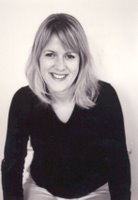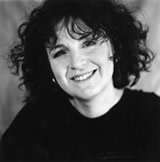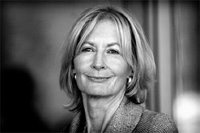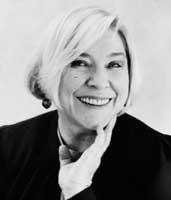 Jojo Moyes (left) commented on my last post to say that Daisy Goodwin did have a valid point when she said:
Jojo Moyes (left) commented on my last post to say that Daisy Goodwin did have a valid point when she said:"female readers of romantic fiction were still generally dismissed by the men who run literary papers."And a similar point was made by Debbie Taylor (below), the editor of Mslexia, in a piece in today's Independent.
"Men simply don't like women's writers," Taylor says. "When men buy fiction they won't go near women's fiction." But with more women becoming publishing editors and newspaper literary editors, some of the hurdles women writers face are being removed. "It's not that they prefer books by women but situations that were actively hostile to women in the past aren't any more," she says.
 The first quote there is something of a sweeping statement. Looking back at my holiday reading, I find that five of the six books that I read were by women. I would also challenge the way that Taylor switches between "women's fiction" and "books by women" as if these were the same thing.
The first quote there is something of a sweeping statement. Looking back at my holiday reading, I find that five of the six books that I read were by women. I would also challenge the way that Taylor switches between "women's fiction" and "books by women" as if these were the same thing.I have had a look at some recent broadsheet book review sections. Friday's Independent has five proper reviews of novels (I am ignoring short stories, poetry and children's fiction for the purposes of this exercise):
- Elizabeth Speller on The Fall of Troy by Peter Ackroyd
- Roz Kaveny on The Meaning of Night by Michael Cox
- Christina Patterson on Arlington Park by Rachel Cusk
- Wendy Brandmark on Special Topics in Calamity Physics by Marisha Pessl
- Shusha Guppy on Glass Houses by Sandra Howard
Saturday's theguardian has four full reviews of novels:
- Helen Dunmore on Restless by William Boyd
- James Lasdun on Arlington Park
- Peter Dempsey on Special Topics in Calamity Physics
- Rowan Pelling on Vocational Girl by "Rosa Mundi"
What does this tell us, if anything. One thing that struck me was that all the Independent reviews (with the exception of the Caryl Phillips mini) were written by women, but that is not immediately relevant.
Of the seven books given full reviews, four were by women and three by men. Of the paperback minis, four and a half were by men and one and a half by women (Maj Slowall is a woman and Per Wahloo a man). Of the crime minis one was by a man and three by women.
This is of course far too small a sample to draw firm conclusions upon, but it does not suggest an overwhelming bias towards male writers.
There is of course the fact that Crime is widely seen as popular fiction for men, and there is a crime round-up but no equivalent Romantic round-up, but that does not seem to have disadvantaged female writers per se.
 But I said above that I did not accept that "books by women" and "women's fiction" are the same thing. Of the books reviewed, can any be considered "women's fiction"? I think that two of them can be. Sandra Howard's Glass Houses fits very comfortably into the category and so, arguably, does Vocational Girl (behind that Rosa Mundi pseudonym lurks Fay Weldon).
But I said above that I did not accept that "books by women" and "women's fiction" are the same thing. Of the books reviewed, can any be considered "women's fiction"? I think that two of them can be. Sandra Howard's Glass Houses fits very comfortably into the category and so, arguably, does Vocational Girl (behind that Rosa Mundi pseudonym lurks Fay Weldon). Glass Houses is given a very positive review ("Howard weaves the varied strands of her ingenious plot into a smooth and exciting narrative"), Vocational Girl less so ("fearful tosh"), but it appears that this week at least, two broadsheet newspapers have given over space to publish proper reviews not just of books by women, but of women's fiction.
Glass Houses is given a very positive review ("Howard weaves the varied strands of her ingenious plot into a smooth and exciting narrative"), Vocational Girl less so ("fearful tosh"), but it appears that this week at least, two broadsheet newspapers have given over space to publish proper reviews not just of books by women, but of women's fiction.Does two reviews out of nine reflect the relative sales of women's fiction when compared to fiction as a whole? Of course not.
But should the balance of books reviewed in broadsheet book sections reflect the overall pattern of sales? Now that is a question that I will return to at some later date.

6 comments:
Lovers of women's fiction might like to bookmark the What's New In Women's Fiction blog
http://whatsnewinwomensfiction.blogspot.com/
It's an online catalogue of some of the new books in women's fiction, including sagas, chick lit, historical, cosy crime and any other book which is likely to appeal primarily to women.
I was going to suggest that we ought to count the sex of reviewers as well ...
Anyway, to add to your sample from a different point of view (ie to the Guardian's or the Independent's):
this week's Spectator reviews 14 books, 4 and a half of which are by (or edited by) women (Liberty, by Lucy Moore; The War for All the Oceans, by Roy Adkins and Lesley Adkins; A Very British Family, by Laura Trevelyan; Shared Histories, edited by Angela Potter; and Arlington Park, by Rachel Cusk.
One novel, one edited exchange of letters, one biographical study, half a military history, and one women's history.
I would guess that none of these have been designed to "appeal to women", and doubt that that criterion governs very much in the decision making of the Liary Editor of the Spectator.
"Liary" is pretty good. Of course I meant "Literary".
Their 'celebrity' status negates their gender.
Does celebrity status negate a male writer's gender too? And if celebrity has this effect, are there differences in how male and female writers become celebrities? And are there equal numbers of male and female authors who have celebrity status?
I don't think that the reviews of Sandra Howard's book (the Guardian gave it a similarly positive review the previous weekend) were a result of her celebrity status. That would have given her news coverage, certainly, but not, I think, a proper review.
Fay Weldon's celebrity status derives from her being a very succesful writer, so she has surely earned critical attention the right way?
Incidentally, Grumpy Old Bookman wrote a very good piece in July 2005 about why certain books get reviewed everywhere in The Way Things Are.
Interesting point, Stephen, but I do believe you are an exception to the rule. And do you really think any of those books qualify as romantic fiction? Rachel Cusk has always been a "literary" reviewer's favourite, and Sandra Howard would not have been reviewed had she not been married to Michael...
You see the same names popping up again and again on these pages = and if they happen to be "commercial" fiction, you can bet there's a connection (cf Boris Johnson's sister and "Notting Hell"...) *Cynical of Saffron Walden*
Post a Comment